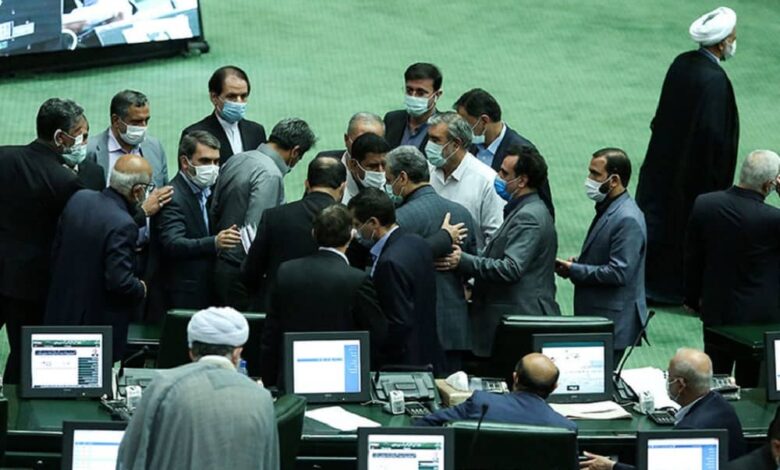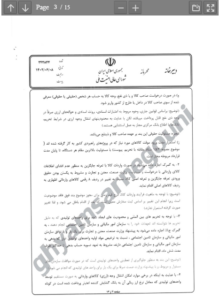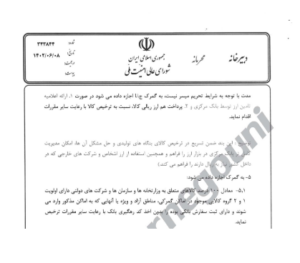Iranian Regime’s Parliament Facilitated Sanction Circumvention, Dissident Group Exposes

majlis
Written by
Mahmoud Hakamian
File Photo: A scene of the Iranian regime’s so-called parliament
Two-minute read
On February 13, with 17 days left until the elections for the Assembly of Experts and the Parliament of the regime, the cyber group Ghiamsarnegouny (Persian for Rise to Overthrow) announced on its Telegram channel that it had seized control of the web server of the Khane Mellat News Agency, affiliated with the regime’s parliament.
The group also declared that it had taken control over 600 servers belonging to the parliament, while also releasing hundreds of pages of classified documents. This group had previously targeted the systems of the regime’s Presidency, the Prison Organization, the Judiciary, the Ministry of Foreign Affairs, and dozens of other governmental agencies, exposing a wealth of information about the oppressive regime ruling Iran. But the disclosure of the new batch of classified documents, particularly regarding the astronomical salaries of the parliament members, all paid out of the people’s pockets, appears to have deep societal ramifications.


A document obtained from the Majlis (regime’s parliament) reveals tactics for circumventing sanctions, allowing individuals to change their identities, manipulating purchase and customs documents, and mitigating damages using financial incentives. One particular document details strategies for bypassing sanctions and aiding involved parties.
The classified letter is signed by Mohammad Mirmohammadi, Deputy for Economy and Technology of the Secretariat of the Supreme National Security Council, and addressed to Mohsen Rezaee, Secretary of the Supreme Council of Economic Coordination. It discusses decisions made during the Counter-Sanctions Headquarters meeting in September 2023.
Copies of this letter were distributed to the heads of the three branches of government, including the Speaker of Parliament, as evidenced by the parliament’s stamped documents.
The Counter-Sanctions Headquarters mandates the Ministry of Intelligence to compile a list of sanctioned individuals every three months for approval by the Secretariat of the Economic Coordination Council.
A recently obtained insider report from the #Iranian regime, marked as “confidential” and acquired by the Iranian dissident group @ghiamsarnegouny provides valuable insights into the thinking rooms of the Iranian regime.https://t.co/N6xoqyVTg4
— NCRI-FAC (@iran_policy) June 19, 2023
Furthermore, in this document, customs structures are weakened to make it difficult to trace goods entering and leaving the country. In another step, “tax exemption for currency (both banknotes and checks)” is introduced, allowing anyone to bring any amount of currency into Iran. At the same time, pension funds and exchange offices will face increased surveillance to restrict people’s access to foreign currency for entering and exiting.
The Central Bank, according to this document, has received boundless capabilities to control banks and people’s money. Conversely, the Ministry of Intelligence is obliged to send a list of sanctioned officials and affiliates of the system to the Secretariat of the Supreme Council of Economic Coordination every three months. The government is also given the possibility to support sanctioned officials and affiliates of the system. For example, they can use “the possibility of changing identity to continue personal activities” or receive “legal-judicial services” domestically and internationally and benefit from “informational-security coverage.”
Sanctioned individuals are granted the ability to change their identities to continue their activities, along with financial incentives in banking, insurance, tax, and customs domains.
Another resolution involves providing legal services domestically and internationally to support managers, agents, and individuals who are taking risks by traversing sanctions.
Methods for circumventing entry of sanctioned and dual-use goods are outlined, including altering documents and bypassing customs procedures. Customs authorities are allowed to modify declaration forms to safeguard information on imported goods.
Additionally, goods belonging to ministries, organizations, and government agencies can clear customs without a bank tracking code. Hoarding foreign currency is regulated, requiring companies with over $500 million in annual exports to use banking networks or obtain guarantees from exchanges.
These measures have established a covert financial system integral to Iran’s economy. Despite efforts to evade US sanctions, some individuals have been detained abroad for their involvement in such activities.
The Counter-Sanctions Headquarters was established in 2018 following the US withdrawal from the JCPOA, aiming to find solutions for selling oil and meeting the regime’s needs in new conditions.

